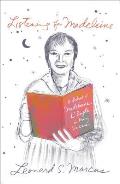The Life Behind A Wrinkle in Time
Yesterday’s New York Times Book Review asked Anne Lamott, “What book changed your life?” And she answered:
“A Wrinkle in Time” saved me because it so captured the grief and sense of isolation I felt as a child. I was 8 years old when it came out, in third grade, and I believed in it — in the plot, the people and the emotional truth of their experience. This place was never a good match for me, but the book greatly diminished my sense of isolation as great books have done ever since. I must have read it a dozen times.The book never grabbed me that way, but it spoke deeply to many readers. Cynthia Zarin’s 2004 profile of Madeleine L’Engle included the author’s response to their passion:
One evening, while we were having supper together, I asked L’Engle about her relationship with her readers. “It scares me shitless!” she said. “Because it’s a responsibility. Over time, someone reads your book, and something happens. People want intimacy, and I have a terrible time saying no.” When people tell her, “You’ve helped me grow up, you’re my mother,” she tends to brush it off: her job, as she sees it, is to write stories, not to be known.That warts-and-all profile appears to be a touchstone for many of the interviews in Listening for Madeleine, Leonard Marcus’s new oral history of L’Engle. The Book Reporter says of the book:
Most interesting are the voices from L’Engle’s childhood, through whom we learn about her distant relationship with her parents, particularly her father, and about her tendency to live her life through her imagination rather than through social relationships—more than one interviewee describes L’Engle as aloof or standoffish compared to her peers. Marcus seems to suggest that her lonely childhood and longing for her dad contributed to the number of absent fathers in her work, most notably Meg’s quest to rescue her father in A Wrinkle in Time.One of those interviews, with a L’Engle cousin, is available from Macmillan. Publishers Weekly published three from colleagues. Kirkus noted in its review:
An actor by training, L’Engle consciously constructed her own public persona, transforming her biography and history into “mythic material,” as with the ever-expanding number of rejections she received for A Wrinkle in Time.The Oz and Ends take on that legend back here.



No comments:
Post a Comment